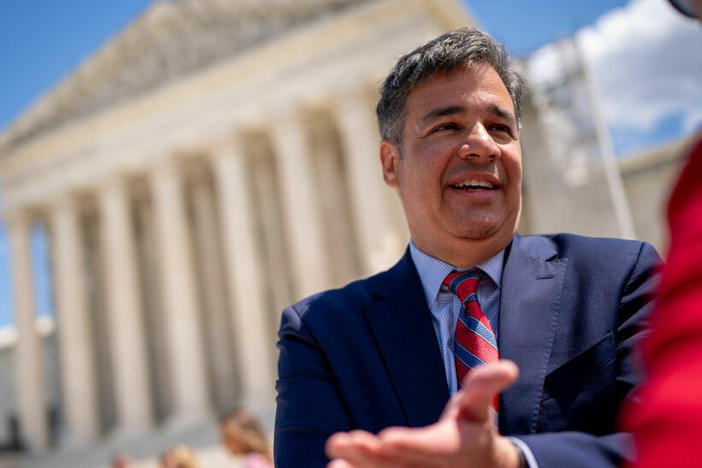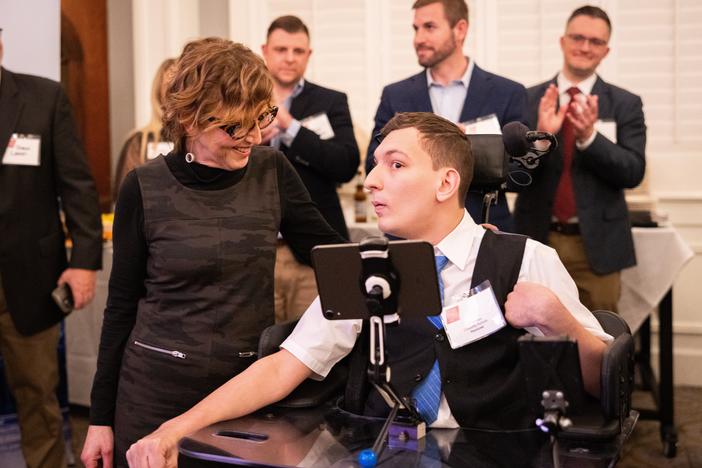Section Branding
Header Content
Abortion-Rights Organizations Are Working Overtime In Texas As SB8 Remains In Place
Primary Content
Lulu Garcia-Navarro speaks with Rosann Mariapurram, executive director of Jane's Due Process, a grassroots organization in Texas that helps people under 18 access abortion care.
Transcript
LULU GARCIA-NAVARRO, HOST:
Texas' controversial abortion law is still on the books after another judge refused to block it last week. That law prohibits terminations after about six weeks, even in the case of incest and rape, and it allows private citizens to sue abortion providers or anyone else who helps a woman break the law and gives them money if they win. What effect is that having on the ground in Texas now? Rosann Mariappuram is the executive director of Jane's Due Process, a grassroots organization in Texas that helps teens access safe abortion care, and she joins us now. Hello.
ROSANN MARIAPPURAM: Hi. Thanks so much for having me.
GARCIA-NAVARRO: Walk us through what these past two weeks have been like for you and your organization.
MARIAPPURAM: In some ways, we knew this day was coming. We've been fighting against the six-week abortion ban since it was introduced in the Texas legislature. But in other ways, it's so hard to be prepared to lose abortion care overnight. So we went from, you know, in August, being able to help people through the process, get teens the care they needed, to, come September 1, being almost completely cut off.
GARCIA-NAVARRO: Of course, preserving privacy - can you tell me the story of someone that you're helping or is seeking help?
MARIAPPURAM: Sure. So the majority of young people involve a parent, if they can do it safely, in their reproductive health care decisions. But for the teens we work with, if someone in their family knew they were pregnant, they might get kicked out of their home. They might be forced to continue a pregnancy against their will. So the young people we work with are in really challenging circumstances. And so a lot of them find out they're pregnant, decide that they want an abortion. They don't want to continue the pregnancy, but then they don't know what to do because Texas requires parental consent. And so we have people call us and we explain that you can still get an abortion, but you have to go and speak with a judge and actually get permission from a court to be able to get care. And then we kind of walk them through that process. We provide them a free attorney. We help cover any of the costs around the abortion care. And we also just provide a lot of emotional support.
So we had teens who were calling us at the end of August, and they knew the law was about to take effect. And so, you know, they were really scared. And they were trying to say, can I get it today? Can I - like, what can I do to make it faster? And the hard reality is just that, for some of the teens who called us at the end of August, they were able to get the permission from the court, but then they were past six weeks come September 1. And so now they can't get care here in Texas.
GARCIA-NAVARRO: And what kind of psychological effect is that having on them?
MARIAPPURAM: I mean, I think the young people we work with are incredibly resilient, but it is heartbreaking, I think, for them to know that they had made a decision. They know what's best for them, but they cannot end the pregnancy, and so they might be forced to parent against their will.
GARCIA-NAVARRO: Let me ask you this. Has this law essentially stopped what you do?
MARIAPPURAM: So I would say that for the majority of people who come to us, they're over six weeks. There are a handful of youth who find out they're pregnant before six weeks. And in those instances, we're trying to move as quickly as possible. But that process I mentioned, the judicial bypass process - it inherently causes about two weeks, sometimes three weeks of delay. So in some ways, yeah, it has completely stopped our process because even if we can help someone get a bypass, they still might be past six weeks by the time they get that permission from the court.
GARCIA-NAVARRO: Are you worried about being sued? Because obviously one of the provisions of this law is that anyone who helps a woman or a young girl do this could be liable.
MARIAPPURAM: Yes. It's hard, right? Because the law was designed to be enforced by private citizens, so really to evade constitutional review. And it kind of turns even sharing information or just trying to help someone into possibly a lawsuit. So we're trying hard to - you know, we're adhering to the law. All the clinics are adhering to the law, but also just sharing information shouldn't put us at risk, and yet the law is designed to chill our speech and to force us into not even helping people with information. So we're concerned, but we're also not going to be intimidated out of helping.
GARCIA-NAVARRO: Well, explain to me what that looks like for you if, essentially, your work has been stifled. I mean, what comes next?
MARIAPPURAM: So right now, you know, we are still fighting in the courts. The Department of Justice has filed a lawsuit. We were part of the initial federal lawsuit. And we know this law is unconstitutional. I think it's pretty heartbreaking that the U.S. Supreme Court refused to get involved in the first lawsuit. But, you know, we know what our fundamental rights are, so the courts can't completely abandon that. We're also fighting hard to get federal action. There is currently before Congress a bill called the Women's Health Protection Act that would not only repeal the Texas six-week ban but actually repeal dozens of bad anti-abortion laws in Texas and across the country. So we're pushing hard for Congress to vote in both the House and the Senate and approve the Women's Health Protection Act.
And then on a daily basis, our hotlines are open. We're trying hard to get teens in Texas to still call and text us so we can tell them what their options are. And, you know, there are clinics out of the state. And so if a young person can safely get out of the state, we always support their right and freedom to travel for health care.
GARCIA-NAVARRO: That is Rosann Mariappuram. She is the executive director of Jane's Due Process. Thank you very much.
MARIAPPURAM: Thanks so much.
(SOUNDBITE OF MUSIC) Transcript provided by NPR, Copyright NPR.
Bottom Content



